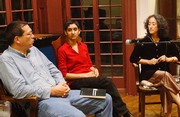Two authors, grant recipients speak
The Daily Pennsylvanian
September 19, 2003

-
Writers Sesshu Foster, left, and Karen Tei Yamashita, center, speak about their work at Kelly Writers House last night. Mytili Jagannathan, right, organized the event with the aid of $1,000 given as part of the Kerry Prize.
Photo by Liz Guise/The Daily Pennsylvanian
Despite the precarious weather situation on the East Coast, writers Sesshu Foster and Karen Tei Yamashita made their way from Los Angeles, Calif., yesterday to speak at the Kelly Writers House.
Foster and Yamashita were brought to Penn through the aid of the Kerry Prize, a grant of $1,000 awarded to the person who proposes a program that best captures the spirit of the Writers House.
The recipient of this year's prize, former graduate student Mytili Jagannathan, was responsible for last night's event -- the first official collaboration between the Writers House and the Asian Arts Initiative, a community arts center that focuses on bringing forth Asian-American stories.
Jagannathan explained in her introduction of Foster and Yamashita that she wanted to "draw on some of the many connections between Karen and Sesshu and their interest in cities and culture," as well as "bring an L.A. context to Philadelphia."
A small group of 17 intrepid listeners braved the rain and winds to listen to the two writers in an intimate discussion.
Both authors incorporate different media into their writing -- ranging from poetry and prose to photography -- and hold a common interest in Los Angeles.
Yesterday's talk included discussion of the city's racial tensions, urbanization and immigration issues.
Foster explained his motivation to write about "the unwritten side of L.A. --the immigrants and the inner city."
Los Angeles "recapitulates an American cultural logic [through the] idea of reinvention and recreation," he said. "It's a city of continual forgetting, amnesia and erasure of people's struggles."
Yamashita explained how she drew on her own experiences growing up in Sao Paulo, Brazil and Los Angeles to investigate topics such as migration, globalization and geography.
"L.A. is a great microcosm of our global situation," she said.
Audience members reacted positively to the literary and social commentary provided by Foster and Yamashita.
An Lam, a 2003 College graduate and staff member of the Writers House, said it was "really interesting to have writers and poets who are of a different ethnicity at the Writers House."
"At Penn you read about these people, but it's not very often you get to hear their voices," she continued.
"Their talks about poetry come from the essence of California," said Norman Shaw, a freelance writer who attended the talk.
Executive Director of the Asian Arts Initiative Gayle Isa said she was excited about the talk because it served as "an amazing experience to bring two writers with Asian-American backgrounds, defining experiences and social critiques together."
According to Isa, the talk served as a "nice intersection of writers who happen to be Asian American, and who speak eloquently about cities, urbanization and the effects of transnational migration."
The Daily Pennsylvanian
September 19, 2003

-
Writers Sesshu Foster, left, and Karen Tei Yamashita, center, speak about their work at Kelly Writers House last night. Mytili Jagannathan, right, organized the event with the aid of $1,000 given as part of the Kerry Prize.
Photo by Liz Guise/The Daily Pennsylvanian
Despite the precarious weather situation on the East Coast, writers Sesshu Foster and Karen Tei Yamashita made their way from Los Angeles, Calif., yesterday to speak at the Kelly Writers House.
Foster and Yamashita were brought to Penn through the aid of the Kerry Prize, a grant of $1,000 awarded to the person who proposes a program that best captures the spirit of the Writers House.
The recipient of this year's prize, former graduate student Mytili Jagannathan, was responsible for last night's event -- the first official collaboration between the Writers House and the Asian Arts Initiative, a community arts center that focuses on bringing forth Asian-American stories.
Jagannathan explained in her introduction of Foster and Yamashita that she wanted to "draw on some of the many connections between Karen and Sesshu and their interest in cities and culture," as well as "bring an L.A. context to Philadelphia."
A small group of 17 intrepid listeners braved the rain and winds to listen to the two writers in an intimate discussion.
Both authors incorporate different media into their writing -- ranging from poetry and prose to photography -- and hold a common interest in Los Angeles.
Yesterday's talk included discussion of the city's racial tensions, urbanization and immigration issues.
Foster explained his motivation to write about "the unwritten side of L.A. --the immigrants and the inner city."
Los Angeles "recapitulates an American cultural logic [through the] idea of reinvention and recreation," he said. "It's a city of continual forgetting, amnesia and erasure of people's struggles."
Yamashita explained how she drew on her own experiences growing up in Sao Paulo, Brazil and Los Angeles to investigate topics such as migration, globalization and geography.
"L.A. is a great microcosm of our global situation," she said.
Audience members reacted positively to the literary and social commentary provided by Foster and Yamashita.
An Lam, a 2003 College graduate and staff member of the Writers House, said it was "really interesting to have writers and poets who are of a different ethnicity at the Writers House."
"At Penn you read about these people, but it's not very often you get to hear their voices," she continued.
"Their talks about poetry come from the essence of California," said Norman Shaw, a freelance writer who attended the talk.
Executive Director of the Asian Arts Initiative Gayle Isa said she was excited about the talk because it served as "an amazing experience to bring two writers with Asian-American backgrounds, defining experiences and social critiques together."
According to Isa, the talk served as a "nice intersection of writers who happen to be Asian American, and who speak eloquently about cities, urbanization and the effects of transnational migration."
